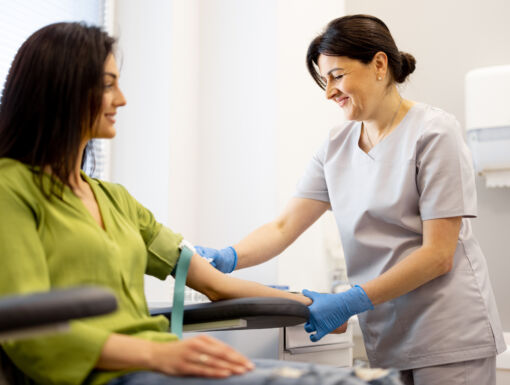
What Should I Discuss With My Doctor at My Annual Wellness Exam?
Making an appointment for your annual wellness exam is one of the best things you can do for your health. A visit to your primary care physician is often the first line of defense against preventing major illnesses. These annual visits are also the best way to understand the state of your overall health.
Here are the essential topics and screenings to cover with your primary care physician during your annual wellness exam.
Family Medical History
It’s important to know as much of your family’s medical history as you can. Ask your immediate family members what medical problems run in the family. Is there a history of cancer? Alzheimer’s? Heart disease? Your doctor can assess this information and recommend screenings if he or she feels you are susceptible to certain conditions.
Medications
Always bring all prescribed medications including over-the-counter medications and supplements to all of your visits, even if your doctor has a list of them in the computer system.
Vital Signs and BMI Check
Your primary care physician will review your vital signs including weight, height, blood pressure, heart rate, respiration rate and temperature during your visit. It is crucial to understand what each one means and familiarize yourself with the numbers you should be hitting. Your doctor can calculate your BMI based on your weight and height to determine if you are at a healthy weight. Your doctor can recommend dietary improvements and a plan to help you get to a healthy weight.
Labs
Ask your doctor if he or she recommends any labs and if so, make sure you understand why.
Vaccines
Are there any vaccines you’re missing or that require a booster? Discuss with your physician for his or her recommendation. If you are visiting a new doctor bring a copy of your vaccination records. Your wellness exam is also a good time to get your yearly flu shot if you didn’t get one at the start of the season.
Fasting
Check with your doctor to see if any tests require you to fast the night before. Fasting ensures that your screenings produce the most accurate results. The fasting period usually is nine to 12 hours before your test. If you can’t go that long without food, try to schedule your appointment in the morning.
Mental Health
If you have been experiencing feelings of depression or anxiety, now is the best time to speak with your primary care physician. He or she can provide you with resources to speak with a counselor or discuss if you’ll need further follow-up to discuss medications or treatment plans.
Health Exams for Men
- Abdominal aortic aneurysm screening. This is a one-time screening ultrasound for men between the ages of 65-75 who have a history of smoking. This will assess if the aorta is enlarged.
Health Exams for Women
- Bone mineral density test (DEXA). Screening exam for osteopenia or osteoporosis. Peak bone mass occurs at age 30 and then begins to decline. Women should have this test starting at age 65, however, some women may qualify for screening earlier based on risk factors such as hysterectomy, steroid use, tobacco use or hypothyroidism. The screening interval is every three to five years.
- Screening for breast cancer (mammogram). Mammograms begin at age 40 or sooner if there is a family history of breast cancer or prior history of breast cancer.
- Screening for cervical cancer (Pap smear). Cervical cancer screening begins at age 21. Women in their twenties should get a Pap smear every three years. Women between ages 30 and 65 should get a Pap smear every five years with HPV co-testing. The screening interval for future exams may be adjusted based on current or prior test results.
Health Exams for Both Men and Women
Colonoscopies begin at age 45 and are repeated every 10 years. Repeat screening may be less than 10 years based on results such as precancerous polyps. Screening may start before age 45 if there is a family history of colorectal cancer. Other options for colorectal cancer screening include either a yearly fecal occult blood test (FOBT), a stool sample that detects blood, or Cologuard, a stool sample that detects blood and molecular markers that signify the presence of precancerous lesions. Cologuard screenings are performed every three years. A positive FOBT or Cologuard will warrant a colonoscopy. Fecal occult blood tests and Cologuard can both be done at home but are inferior to the gold standard of colonoscopy performed by a physician, as this gives real-time visualization of the colon.
Screening for diabetes with a fasting blood glucose level or hemoglobin A1C (HA1C).
Vision and audiology exams. A comprehensive eye exam should be done yearly for diabetics and patients with high blood pressure. Routine vision exams are important for all ages. Men and women over 65 should have a vision exam every one to two years to screen for cataracts, glaucoma and macular degeneration. Hearing loss is a leading cause of depression in the elderly and can be mistaken for a number of other conditions. A visit to the Audiologist to test hearing can determine if there is conductive (blockage such as wax) or sensorineural (related to nerves) hearing loss.
Vaccinations. Vaccination against streptococcus pneumonia begins at age 65. Prevnar 20 is a single-dose vaccination. Another option is Prevnar 13 followed in one year by Pneumovax 23. Administration of both vaccines may begin before age 65 depending on certain health conditions. After completion of both vaccines after age 65, there are no further required booster immunizations. In the past Pneumovax 23 was given every five years.
Shingrix (shingles vaccine) provides immunization against shingles and is administered to men and women over age 50. This is a two-dose vaccination given two months apart. This is a new form of the vaccine as compared to the previously administered single dose Zoster.
TDAP (tetanus with pertussis) is recommended in place of a tetanus booster once in adult life. This will serve as a tetanus booster, but also provide immunization against pertussis, or whooping cough. This is now being administered to all pregnant women in the third trimester. A tetanus booster is administered every 10 years.
Annual influenza vaccination.
COVID-19 vaccine guidelines are actively being updated. For the most recent recommendations please reference the CDC and Louisiana Department of health websites.
Men and women should also get the first dose of the HPV vaccine between the ages of 11 and 12 and then six to 12 months after the first dose. The vaccine is also recommended through the age of 26. Guidelines regarding vaccination schedules are updated frequently. Speak with your doctor to ensure you don’t have any contraindications to being vaccinated or if there are new updates regarding the vaccines.
Screening for hypertension (high blood pressure). Screening begins at age 20 and should continue every two years.
Screening for hyperlipidemia (high cholesterol). Screening begins at age 20 with a fasting lipid (cholesterol) panel. Repeat screening is every one to two years. However, your primary care physician may recommend screening more often if you are at risk for factors such as heart disease or stroke. Based on your age, the 10-year risk of heart attack or stroke (ASCVD risk) will be calculated to determine if you will need a cholesterol medication such as a statin. If you are at intermediate risk your doctor may discuss a CT calcium score to assess the plaque burden in the arteries of your heart.
Screening for sexually transmitted infections (STIs), HIV and Hepatitis C. HIV screening is done at least once between ages 15-65 and may be repeated depending on risk factors. Hepatitis C screening is done at least once for all adults greater than age 18. Guidelines are frequently updated, as now the USPTF is recommending a universal screening of all patients for Hepatitis C.
Booking your annual wellness exam should be at the top of your yearly checklist. Not only are you getting yourself checked out, but an annual wellness exam is the first step in becoming an active participant in your health. Establish a relationship with a primary care physician who you feel is an advocate for your health and well-being!
To learn more about Dr. Sarah Champagne, or to make an appointment, click here.


